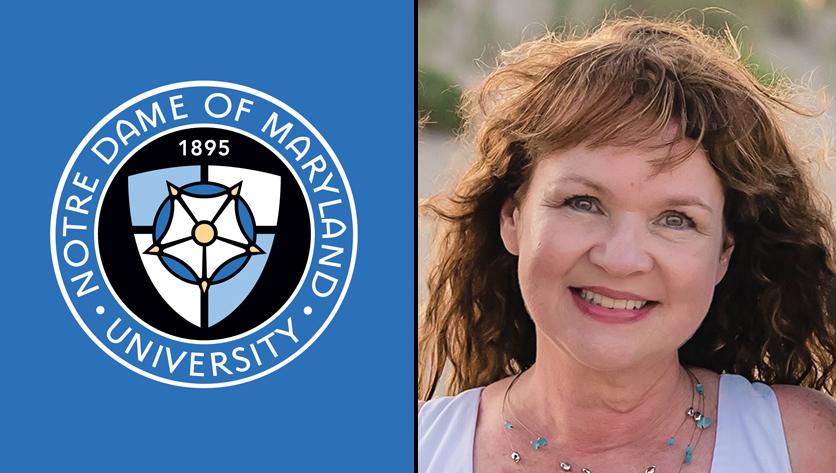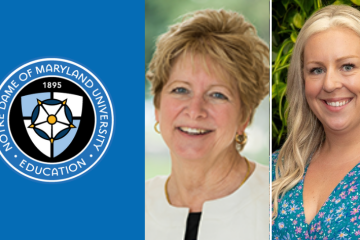NDMU Master’s Graduate Continues Career of Service as Director of Anne Arundel County’s Department of Public Works

By: Erik Pedersen, Communications Senior Manager
BALTIMORE – Karen Henry M’02 has dedicated her professional life to public service. After working for over 30 years in a variety of positions for Anne Arundel County Government, her career reached a new peak last December when she was selected as acting director for the county’s Department of Public Works.
Henry was then named permanent director for the department in March. She oversees a staff of over 700 employees working in the Bureaus of Engineering, Highways, Utility Operations, Waste Management Services, and Watershed Protection and Restoration. After previous stints working in the Office of Community Services and Department of Aging and Disabilities, Henry first joined the Department of Public Works in 2000. She gained additional potential for career growth two years later after earning a master’s degree in liberal studies from Notre Dame of Maryland University.
Learn more about Henry’s career in public service, including how her NDMU degree benefited her professionally:
What originally inspired you to get involved in local government work?
When I was an undergraduate student, I had an internship with Anne Arundel County Government working in their urban renewal office. What I saw there was an ability to quickly respond to requests and get things done. I really liked the opportunity to interact directly with the community.
I had great leadership which really inspired me, and I enjoyed that job a great deal. I didn’t think at the time that it would necessarily become my career – I went to school as an undergraduate for marketing and international business – but an opportunity came up in Anne Arundel County’s Office of Community Services, and that became my first real government job. I coordinated and ran special projects and events for the county.
Some of those events involved the whole county government, so I got to know a lot of people from other departments. There are stereotypes out there about public service workers, but what I’ve found is that most of the people I’ve worked with are extremely dedicated. They’re not always appreciated, but they work long hours, and they’re really making a difference and meeting the needs of our community no matter what the job might be. In public works, we deal with roads, stormwater management, trash collection, recycling, water and sewer treatment and maintenance – we’re responsible for a lot of everyday things that people need in order to function in their lives.
How did your previous role as assistant director help prepare you for your current position, and what are some of your primary responsibilities as Anne Arundel County’s Director of Public Works?
I became the assistant director back in 2016. That gave me a lot of experience with the department as a whole. Overseeing all of the legislation that we deal with. Managing our budget – we have a budget of $265 million this year for the department’s five bureaus combined. We also have over 750 employees, and a big part of my job as assistant director involved working directly with our employees and our human resources manager. Working through recognition opportunities, grievances, career advancement programs – I implemented several career advancement programs for individuals, so that when they join the Department of Public Works, it’s not just one job for a short period of time. We want to create careers and advancement opportunities through the different types of positions that we have.
When our director retired last December, the county executive asked if I would fill in on an acting basis, and he ended up selecting me to fill that position permanently. I am basically the official cheerleader for all things public works. One of my big missions for the job is to educate the public about what we do and to hopefully get them to appreciate what we do. A lot of our work is taken for granted. When you drive on a road, you’re not thinking about how that road got there, who fixes that road, how that traffic sign got there, how it was determined that a traffic sign was needed in that location. In the Department of Public Works, we think about it 24/7. We’ve got traffic engineers and analysts on staff that are monitoring and evaluating traffic signals, when they come on and off, and how that whole road network works. When you flush your toilet, we’re making sure 24/7 that the waste water goes to the proper location and is treated with state of the art wastewater treatment processes. Those are just a couple examples of things what we do.
How are you able to balance the department’s many responsibilities to make sure that everything gets done?
First of all, I have really excellent deputy directors who run the department’s five bureaus. We also have a really great county executive. Steuart Pittman has been very supportive of our programs and new initiatives. He is a great listener, and he makes sure that we get the resources that we need. Our county council is great as well – if there’s funding needed for what we want to do, they’ve been really supportive in making sure that we get the proper financial support to continue to be successful and meet the needs of our county residents.
What led you to enroll in your master’s program at Notre Dame, and how did it benefit you professionally?
My friend had recently earned a master’s degree in management from Notre Dame, and she had a lot of great things to say about the program. I was looking to earn a master’s at the time as well, so I thought that could be a good fit for me. When I went to visit the admissions office, though, I was drawn to a brochure for their liberal studies program. It sounded so interesting – it seemed to have a little bit of everything.
I took classes in music, art, physics, history, English, philosophy, just so many different areas. Sister Kathleen Feeley (NDMU President Emerita) was one of my English class professors, and she was tough as nails. I still hear her in my head every time someone uses a cliché. She would always tell us – don’t ever use clichés. You need to go deeper. The program as a whole really improved my critical thinking skills. It helped me grow intellectually and think beyond the surface level. With the amount of people that I work with on a daily basis and the need to solve problems effectively, that has been a great skill to have.
What are some accomplishments that you’re most proud of contributing to during your time with the Department of Public Works?
I’m really proud of creating employee career path programs, where they can advance professionally through the acquisition of skills. The usual government model for advancement is gaining seniority after being in the job for X number of years. You get pay increases by time and grade, just for being there. That can be great – I recently received a long list of people who have worked in our department for over 30 years, so we have some seriously dedicated people here – but that model doesn’t encourage new skills and growth. One of the main things that I implemented in the department was additional programs to help people advance their careers without having to wait for someone to retire or leave their position. If you learn the necessary skills, you can advance within a certain classification or series of classifications.
I’m also proud of how we’ve stepped up our public information program. We created a campaign called DPW and You. The message is to educate the public on how we can help them. For example, we don’t have employees that just drive around looking for potholes. We need the public to tell us and report it. Once it’s reported, we will make at least a temporary repair to that pothole within 48 hours to address the safety concerns. We’ve really increased our social media presence, and we’re also attending more public gatherings to inform the public about what we do and how we can work together to make our County great.
Do you have a message for current students who might be interested in a career in public works?
Our website has all the open positions, but if there is anyone at NDMU interested in a position they can reach out to me directly. I’m happy to talk to them about what kind of careers we have, and how they can make themselves a strong candidate for those positions.
We have a lot of engineers on staff, but we have plenty of support positions as well. We have employees working in finance, we have people that specialize in public relations, we have energy workers. We have a lot of positions the work to protect the environment – for example, our storm water management folks are dedicated to slowing down storm water so that pollutants don’t go into our waterways. There are so many options, and we would love to have any NDMU students who are interested.
Established in 1895, Notre Dame of Maryland University (NDMU) is a private, Catholic institution in Baltimore, Maryland, with the mission to educate leaders to transform the world. Notre Dame has been named one of the best "Regional Universities North" by U.S. News & World Report.




